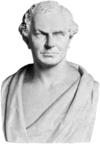Книга: Whewell William «The Theological Works of Isaac Barrow, Volume 2»

|
Серия: "-" Книга представляет собой репринтное издание. Несмотря на то, что была проведена серьезная работа по восстановлению первоначального качества издания, на некоторых страницах могут обнаружиться небольшие "огрехи" :помарки, кляксы и т. п. Издательство: "Книга по Требованию" (2011)
Купить за 1324 руб в My-shop |
Другие книги автора:
| Книга | Описание | Год | Цена | Тип книги |
|---|---|---|---|---|
| The Theological Works of Isaac Barrow, Volume 4 | Книга представляет собой репринтное издание. Несмотря на то, что была проведена серьезная работа по… — Книга по Требованию, - Подробнее... | бумажная книга | ||
| The Theological Works of Isaac Barrow, Volume 1 | Книга представляет собой репринтное издание. Несмотря на то, что была проведена серьезная работа по… — Книга по Требованию, - Подробнее... | бумажная книга | ||
| The Theological Works of Isaac Barrow, Volume 6 | Книга представляет собой репринтное издание. Несмотря на то, что была проведена серьезная работа по… — Книга по Требованию, - Подробнее... | бумажная книга |
Whewell, William

* * *
* * *
Источник: Whewell, William
См. также в других словарях:
Isaac Newton — Sir Isaac Newton … Wikipedia
Tracts for the Times — The Tracts for the Times were a series of 90 theological publications, varying in length from a few pages to book length, produced by members of the English Oxford Movement, an Anglo Catholic revival group, from 1833 to 1841. There were about a… … Wikipedia
Origin of the Romanians — History of Romania This article is part of a series Prehistory … Wikipedia
William Whewell — Infobox Scientist name = William Whewell box width = 300px image width = caption = William Whewell (1794 1866) birth date = birth date|1794|05|24 birth place = Lancaster, Lancashire, England death date = death date and age|1866|03|06|1794|05|24… … Wikipedia
English literature — Introduction the body of written works produced in the English language by inhabitants of the British Isles (including Ireland) from the 7th century to the present day. The major literatures written in English outside the British Isles are… … Universalium
mathematics — /math euh mat iks/, n. 1. (used with a sing. v.) the systematic treatment of magnitude, relationships between figures and forms, and relations between quantities expressed symbolically. 2. (used with a sing. or pl. v.) mathematical procedures,… … Universalium
